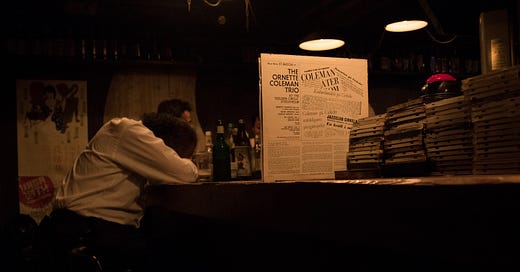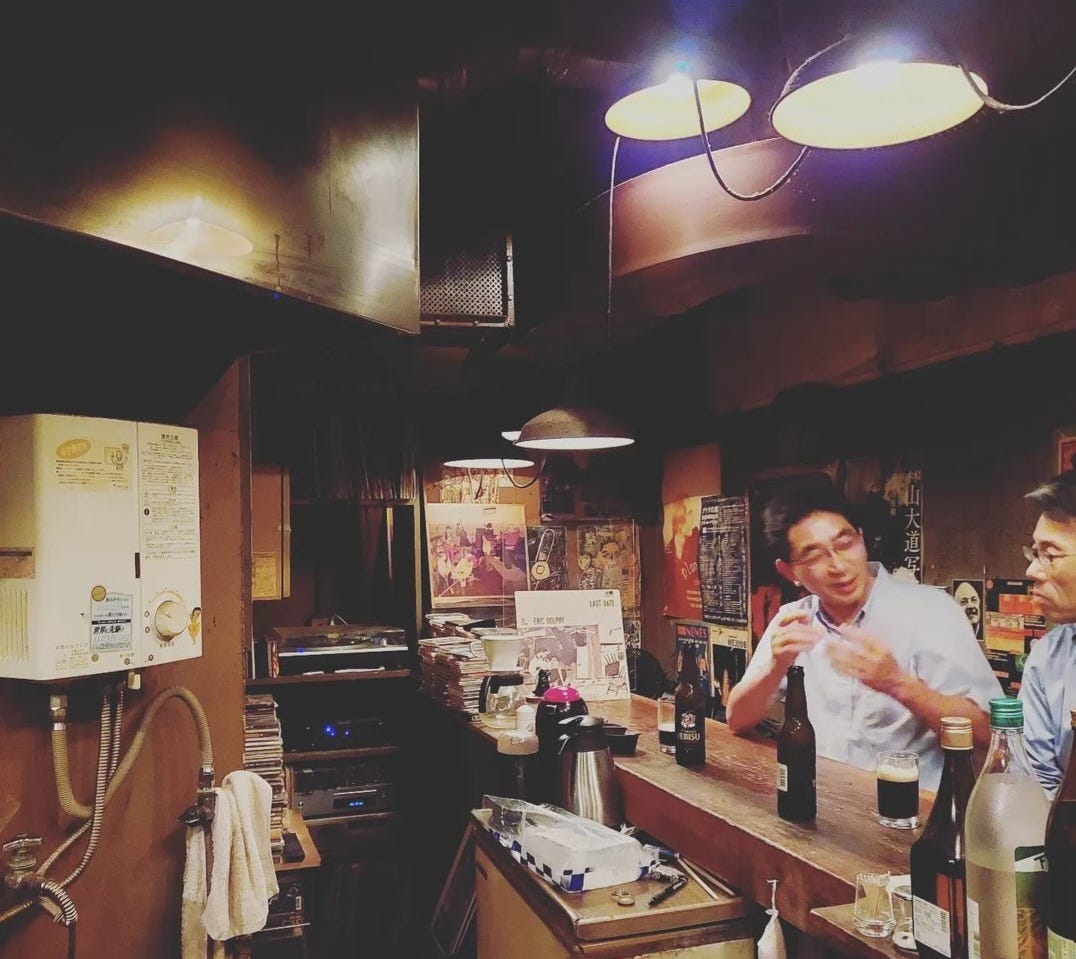If you’re in Tokyo, and you have a free evening, take the JR Yamanote line to Ikebukuro Station. Walk due east about three blocks. Midway down an alley, there’s an apartment building on the right. Take the elevator four floors up. Turn left. Open the door.
Paper Moon was opened all the way back in 1975. In Tokyo, it is one of a long lineage of vinyl record bars, small corners of the dense metropolis devoted to drinks and music, usually jazz. After World War II, imported vinyl LPs were too pricey for most Japanese to purchase. So record bars (also called music kissas or cafes) sprang up all around the recovering city. Salarymen wiled away late hours listening to the latest from overseas. “The act of going to a cafe and listening to a new release in a social, group setting became the norm for a generation of Japanese jazz fans”, writes Anton Spice in a lovely photo essay for Vinyl Factory. “At its height, areas like Shibuya and Shinjuku in central Tokyo had dozens of these cafes and bars scattered around the main station plazas.”
Not many remain. Still, Tokyo retains its reputation as a haven for audiophiles, where people pay good money to sit in small spaces, close together, nearly silent, listening to music on exquisite equipment. Meikyoku Kissa Lion, in Shibuya, is a Baroque cinema of sound that serves chilled coffee to patrons as classical music pours from the ceiling-high stereo system and a giant bust of Beethoven presides over the proceedings. In Bar Nightingale, a seven-seat hovel somewhere in the middle of Shinjuku’s chaotic Golden Gai, the bartenders are mostly hostile and the music is a wilfully, wonderfully inaccessible mix of noise and drone. In sHeLTeR, a basement near the city’s outskirts, DJs mix experimental vinyl as a mirror ball glimmers overhead.
But Paper Moon is especially lovely. As Time Out has it, “Paper Moon is as close as it gets to being a Showa-era jazz dive in the 1970s, all seats at the L-shaped counter, all ears tuned in to the music.” Jess and I visited Paper Moon four years ago, on our first trip to Japan. I loved everything about it - the wood-topped bar, the low-slung ceiling, the exposed wiring, the walls brimming with jazz LPs. And the stooped, grey-haired proprietor Yamamoto-san, serving you a whisky and selecting records he liked, propping up the sleeve so you could view and approve of his choices.
We spent a long time there. We met a German, who travels to Japan often for work. He said he comes to Paper Moon every chance he gets. He said that Yamamoto-san is the last of an era, more or less the final practitioner of a certain type of nightlife that is on the way out. Tokyo is changing and it doesn’t have time for memories like this. I guess that was an overstatement but it fit the vibe.
I went back to Tokyo last weekend. I was sure that Paper Moon was gone, done in by COVID or time or an electrical fire. But it’s still there! I spent most of Saturday night at the bar, drinking and listening to Eric Dolphy (Last Date and Live in Germany). I ate some popcorn and wrote a little. I met a local jazz musician who said he plays the violin badly but comes here basically every week. When he left he told me he’d say hi four years from now when I came back for another round.
I think that many true loves start out as affectations. When we’re young it can be hard to tell the difference, in ourselves and in others. We grab hold of an image or an idea - a way of being, a way of moving through the world - and we hang onto it. We conscript it, make it part of us by force. I have it on good authority that I was pretty insufferable when I was younger. I feel embarrassed about that, even today. But the flip side of spending a lot of time pretending to enjoy something you don’t understand is that, sometimes, you wake up one day and realize you’ve actually fallen in love.
Jazz is like that for me. Jazz is a vast and difficult genre, formed by histories and tidal pulls I can’t fathom. It is vertiginously complex, embracing and repudiating tonal and technical rules that never made sense to me. Jazz is as much a mystery to me today as it was two decades ago when my mom bought me A Love Supreme on CD. I listened to that album for probably two years before I fell in love with it. But fall in love I did, and the door opened.
Another lesson - I used to feel that there was some warm center to life I couldn’t find, that I was permanently excluded from whatever it was that made other people so interesting. It turns out that feeling is common to all. And it fades over time. There is in fact no center to anything, no holy of holies, no inner sanctum. The world holds no teleology that we can easily discern. Life is not a journey towards some fixed point on the far horizon. But it is vast, and rich, and precious, and astoundingly beautiful. It is is a series of contingent moments, each of them perilous and miraculous, each of them different from the other. And we ourselves are different things, as we move in and between them.
Cormac McCarthy passed away last week. I finished his novel The Passenger on the flight home to Bangkok. It is a strange book, lacking (thankfully) the wearying brutality of his earlier work. But it is true to form - beautiful and desolate to the last. And I think the novel is something like McCarthy’s final word on the matter, his theory of everything.
What is his theory? As near as I can tell: The world is finally indeterminate and gives no answers to any question of any importance. It is full of great and terrible beauty that vanishes when we leave it. What it all means, and what comes after, is a mystery - a tale told by an alien intelligence in a language we do not understand. In that way, it has nothing to do with us.
Of course, McCarthy said that his books didn’t need interpreting seeing as everything was right there on the page if you would just go and fucking read it yourself. So, here you go:
When we and all our works are gone together with every memory of them and every machine in which such memory could be encoded and stored and the earth is not even a cinder, for whom then will this be a tragedy? Where would such a being be found? And by whom?
And later:
If we are not after the essence, Squire, then what are we after? And I’ll defer to your view that we cannot uncover such a thing without putting our stamp upon it….But listen to me, Squire. Where the substance of a thing is an uncertain business the form can hardly command more ground. All reality is loss and all loss is eternal. There is no other kind. And that reality into which we inquire must first contain ourselves. And what are we? Ten percent biology and ninety percent nightrumor.
I think McCarthy is probably right about all of this. But also, as Eugene McCharraher puts it, “Matter is good; material life should be cherished and savored as the sensuous gift of creation.” That is not an antidote, and it is not a contradiction. Both truths exist alongside each other. If anything they are dependent. They inform each other, speak to each other, map out each other’s borderlands.
In Essays in Idleness, the Japanese Buddhist monk Kenkō wrote:
If man were never to fade away like the dews of Adashino, never to vanish like the smoke over Toribeyama, but lingered on forever in the world, how things would lose their power to move us! The most precious thing in life is its uncertainty. Consider living creatures - none lives so long as man. The May fly waits not for the evening, the summer cicada knows neither spring nor autumn. What a wonderfully unhurried feeling it is to live even a single year in perfect serenity! If that is not enough for you, you might live a thousand years and still feel it was but a single night’s dream.
It is the limitedness of things that gives them their beauty and their grief, and maybe in some sense their meaning. Backstopped, always, by sheer wonder that things exist at all, and that we are here to see them.
These days I don’t have a theory of anything in particular. I think that the world has meaning but not coherence. I think we move through it learning nothing much, or learning the wrong things. I believe with Kenkō that it is stupid to “insist on complete sets of everything; imperfect sets are better.” I think the world is always beautiful and I think that we notice this beauty often. I think that Paper Moon is a good place for noticing. Visit, if you’re ever in Tokyo, and you have a free evening.





